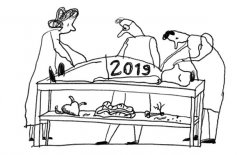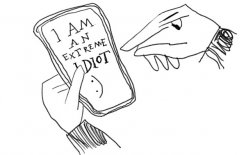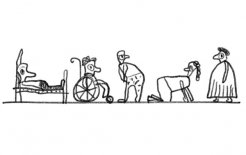
2019 election: The shock of the new normal
Why Morrison’s victory shouldn’t have surprised the major parties
June 2019
Noted
by Helen Elliott
‘Animalia’ by Jean-Baptiste Del Amo
The French author delivers a pastoral that turns on human cruelty

Gascony, 1898. A tenant farmer and his wife crop the fields, raise a few pigs, tend hens, ducks, two cows, a dog and a horse. Their house is also the barn where the breath and bodies of animals help warm the humans over winter. The man knows one thing: unrelenting physical labour. His imagination is stillborn. The wife knows labour but she also knows religion, and she is a fanatic in both. Then a daughter is born – not the miracle granted by any sort of rollicking god but the result of their animal coupling. She is called Éléonore.
Jean-Baptiste Del Amo, although not yet 40, has written four novels and won several significant French literary prizes. Animalia is the first of these to be published in English. His translator, Frank Wynne, also works with Michel Houellebecq. And, like Houellebecq, Del Amo presents scenarios designed to confound.
Éléonore loves her father, and it seems he loves her, although they have no language to express such delicacies. In the long evenings between the beginning of spring and late autumn, when he can sit outside and contemplate the sky, the trees, the earth, Éléonore sits beside him. He has a wasting disease and knows that death has an impatient eye on him. Maybe he welcomes it.
In her religious fervour, his wife is indifferent to human or animal suffering. Del Amo calls her the genetrix – as distinct from mother or wife, which would imply a scrap of something tender. Capable and commanding, she is a malignant animal force in their confined world. She might welcome death as well, but unlike her husband she wants the other life, the eternal one. Whenever possible Éléonore escapes the genetrix’s eye and, often with the pigs and her dog in tow, steals into the idyllic oak groves or lies in the grass in the ruined chapel, hyper-aware of the minute tumble of life around her. She attends the village school but her fundamental lessons are learnt in the fields.
When Éléonore is around 11 and her father is too weak to work, Marcel, a distant cousin, a young man of 19, comes to help. For the sensual, knowing child, closer to animals than humans, Marcel’s physical beautyis intoxicating. He scarcely notices her but he is not unkind and when from one day to the next he leaves for war, she feels cast into a remade hell.
Animalia is in four parts, following the family from 1898 to 1981. By then the farm is a factory processing pigs. Del Amo’s intention in this manqué pastoral is both basic and grand: how can one animal become so cruel at the expense of another? Of every other? One of Éléonore’s grandsons sees the piggery “as the cradle of their barbarism and that of the whole world”. Del Amo isn’t often this direct. He uses language like an Old Testament seer – grandiloquent, exquisitely tuned to the violence and anguish of his biblical rage. But at his centre there is no God, just the random eternality of the earth.
Text Publishing; $29.99

2019 election: The shock of the new normal
Why Morrison’s victory shouldn’t have surprised the major parties
Seoul trained: K-pop and Blackpink
Trying to find meaning in the carefully formulated culture of K-pop
Hate speech isn’t freedom of speech
Australia’s debate over free speech online must go beyond Israel Folau
Aged care in crisis
Stories of neglect and abuse from the royal commission
Northern exposure
COVID-19 is turning Indigenous communities into a tinderbox
Viral injustice
Julian Assange’s extradition trial continues as an attack on journalism
Wage fright
COVID-19 isolation rules have seen artists’ livelihoods disappear
Opposing forces
Even during a time of crisis, history shows that partisan politics has a role to play
Comments